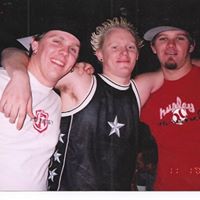Christopher R Granger
age ~51
from Danville, CA
- Also known as:
-
- Christopher Richard Granger
- Christopher Te Granger
- Chris R Granger
- Christoph R Granger
- Christophe R Granger
- Christopher Granger Revocabl
- Christopher Cranger
Christopher Granger Phones & Addresses
- Danville, CA
- Morton, IL
- Fort Myers, FL
- Palo Alto, CA
- Los Altos, CA
- Foster City, CA
- South Wilmington, IL
- Sacramento, CA
Lawyers & Attorneys
Us Patents
-
Combination Treatment With T-Pa Variant And Low Molecular Weight Heparin
view source -
US Patent:20040029798, Feb 12, 2004
-
Filed:Feb 21, 2003
-
Appl. No.:10/371778
-
Inventors:Paul Armstrong - Edmonton, CA
Hal Barron - San Francisco CA, US
Silvano Berioli - Perugia, IT
Frederique Bigonzi - 1'Hay Les Roses, FR
Erich Bluhmki - Schwendi, DE
Richard Chin - San Francisco CA, US
Christopher Granger - Durham NC, US
Frans Werf - Herent, BE -
International Classification:A61K038/17
-
US Classification:514/012000
-
Abstract:The invention concerns an improved therapeutic regimen for the treatment of thrombolytic disorders, such as acute myocardial infarction (AMI). In particular, the present invention concerns the treatment of thrombolytic disorders, e.g. AMI, with a combination of a tissue plasminogen activator (t-PA) variant having improved fibrin specificity and extended plasma half-life when compared with wild-type human t-PA and a low molecular weight heparin.
-
Combination Treatment With T-Pa Variant And Low Molecular Weight Heparin
view source -
US Patent:20060205662, Sep 14, 2006
-
Filed:May 15, 2006
-
Appl. No.:11/435230
-
Inventors:Paul Armstrong - Edmonton, CA
Hal Barron - San Francisco CA, US
Silvano Berioli - Perugia, IT
Frederique Bigonzi - 1'Hay Les Roses, FR
Erich Bluhmki - Schwendi, DE
Richard Chin - San Francisco CA, US
Christopher Granger - Durham NC, US
Frans De Werf - Herent, BE -
International Classification:A61K 38/18
A61K 31/727 -
US Classification:514012000, 514056000
-
Abstract:The invention concerns an improved therapeutic regimen for the treatment of thrombolytic disorders, such as acute myocardial infarction (AMI). In particular, the present invention concerns the treatment of thrombolytic disorders, e.g., AMI, with a combination of a tissue plasminogen activator (t-PA) variant having improved fibrin specificity and extended plasma half-life when compared with wild-type human t-PA and a low molecular weight heparin.
-
Combination Treatment With T-Pa Variant And Low Molecular Weight Heparin
view source -
US Patent:20090004177, Jan 1, 2009
-
Filed:Aug 4, 2008
-
Appl. No.:12/185588
-
Inventors:Paul Armstrong - Edmonton, CA
Hal Barron - San Francisco CA, US
Silvano Berioli - Perugia, IT
Frederique Bigonzi - 1'Hay Les Roses, FR
Erich Bluhmki - Schwendi, DE
Richard Chin - San Francisco CA, US
Christopher Granger - Durham NC, US
Frans Van De Werf - Herent, BE -
International Classification:A61K 38/49
A61P 9/10
G06Q 50/00 -
US Classification:424 9464, 705500
-
Abstract:The invention concerns an improved therapeutic regimen for the treatment of thrombolytic disorders, such as acute myocardial infarction (AMI). In particular, the present invention concerns the treatment of thrombolytic disorders, e.g., AMI, with a combination of a tissue plasminogen activator (t-PA) variant having improved fibrin specificity and extended plasma half-life when compared with wild-type human t-PA and a low molecular weight heparin.
-
Combination Treatment With T-Pa Variant And Low Molecular Weight Heparin
view source -
US Patent:20100196348, Aug 5, 2010
-
Filed:Feb 5, 2010
-
Appl. No.:12/701436
-
Inventors:Paul ARMSTRONG - Edmonton, CA
Hal BARRON - San Francisco CA, US
Silvano BERIOLI - Perugia, IT
Frederique BIGONZI - 1'Hay les Roses, FR
Erich BLUHMKI - Schwendi, DE
Richard CHIN - San Francisco CA, US
Christopher GRANGER - Durham NC, US
Frans VAN DE WERF - Herent, BE -
International Classification:A61K 38/48
A61P 9/10
A61P 7/04
G06Q 90/00 -
US Classification:424 9464, 705500
-
Abstract:The invention concerns an improved therapeutic regimen for the treatment of thrombolytic disorders, such as acute myocardial infarction (AMI). In particular, the present invention concerns the treatment of thrombolytic disorders, e.g., AMI, with a combination of a tissue plasminogen activator (t-PA) variant having improved fibrin specificity and extended plasma half-life when compared with wild-type human t-PA and a low molecular weight heparin.
Isbn (Books And Publications)

License Records
Christopher Lee Granger Md
License #:
CPT.002898 - Expired
Issued Date:
Mar 24, 1998
Expiration Date:
Jun 30, 1998
Type:
Certified Pharmacy Technician
Name / Title
Company / Classification
Phones & Addresses
President
Kodowa, Inc
Custom Computer Programing · Custom Computer Programming Services, Nsk · Software Development
Custom Computer Programing · Custom Computer Programming Services, Nsk · Software Development
1690 Bay St, San Francisco, CA 94123
Medicine Doctors

Christopher B. Granger
view sourceSpecialties:
Cardiovascular Disease
Work:
Duke University Affil PhysicianDuke Cardiology At Southpoint
6301 Herndon Rd, Durham, NC 27713
(919)6815816 (phone), (919)6810811 (fax)
Duke University Affil PhysicianDuke Clinical Research Institute
2400 Pratt St STE 7000, Durham, NC 27705
(919)6688700 (phone), (919)6687028 (fax)
6301 Herndon Rd, Durham, NC 27713
(919)6815816 (phone), (919)6810811 (fax)
Duke University Affil PhysicianDuke Clinical Research Institute
2400 Pratt St STE 7000, Durham, NC 27705
(919)6688700 (phone), (919)6687028 (fax)
Education:
Medical School
University of Connecticut School of Medicine
Graduated: 1984
University of Connecticut School of Medicine
Graduated: 1984
Procedures:
Angioplasty
Cardioversion
Cardiac Stress Test
Echocardiogram
Vaccine Administration
Cardioversion
Cardiac Stress Test
Echocardiogram
Vaccine Administration
Conditions:
Acute Myocardial Infarction (AMI)
Cardiac Arrhythmia
Conduction Disorders
Acute Renal Failure
Anemia
Cardiac Arrhythmia
Conduction Disorders
Acute Renal Failure
Anemia
Languages:
English
Description:
Dr. Granger graduated from the University of Connecticut School of Medicine in 1984. He works in Durham, NC and 1 other location and specializes in Cardiovascular Disease. Dr. Granger is affiliated with Duke University Hospital and Durham VA Medical Center.
Resumes

Christopher Granger
view source
Christopher Granger
view source
Senior Oregon State University
view sourceLocation:
San Francisco Bay Area
Industry:
Financial Services

Advisory Systems Engineer At Syniverse Technologies
view sourceLocation:
United States
Industry:
Telecommunications
Myspace
Googleplus

Christopher Granger
Work:
Hillsborough school district - Teacher
Education:
Florida State University - Political Science, History, International Affairs

Christopher Granger

Christopher Granger
Youtube
Classmates

Christopher Granger
view sourceSchools:
Patchway High School Bristol CT 1992-1995

Christopher Granger | Reg...
view source
South Glens Falls High Sc...
view sourceGraduates:
Chris Granger (1976-1980),
Vicki Michelucci (1975-1979),
Cris Cooper (1976-1980),
Robyn Hayes (1976-1980),
Andrew Scott (1985-1989)
Vicki Michelucci (1975-1979),
Cris Cooper (1976-1980),
Robyn Hayes (1976-1980),
Andrew Scott (1985-1989)

Jennie F. Snapp Middle Sc...
view sourceGraduates:
Chris Granger (1949-1958),
Gary Gould (1949-1953),
Bob Townsend (1963-1966),
John Kowalczyk (1973-1975),
Randy Scales (1968-1971)
Gary Gould (1949-1953),
Bob Townsend (1963-1966),
John Kowalczyk (1973-1975),
Randy Scales (1968-1971)

Patchway High School, Bri...
view sourceGraduates:
Denise Bradley (1963-1968),
Lynq Rj (1967-1980),
Martin Tucker (1993-1998),
Emmileen Connors (1995-2000),
Christopher Granger (1992-1995)
Lynq Rj (1967-1980),
Martin Tucker (1993-1998),
Emmileen Connors (1995-2000),
Christopher Granger (1992-1995)

Hancock High School, Kiln...
view sourceGraduates:
Ninon Melich (1982-1986),
Bradley McKay (1989-1993),
Adam Harris (1989-1993),
Lorin Havens (1999-2003),
Chris Granger (1996-2000)
Bradley McKay (1989-1993),
Adam Harris (1989-1993),
Lorin Havens (1999-2003),
Chris Granger (1996-2000)

Viscount Alexander School...
view sourceGraduates:
Chris Granger (1982-1986),
Craig Sauve (2001-2005),
Wendy Gasque (1985-1992),
Jeff Martelock (1991-1995),
Peter Burgess (1979-1981),
Lois Vining (1975-1984)
Craig Sauve (2001-2005),
Wendy Gasque (1985-1992),
Jeff Martelock (1991-1995),
Peter Burgess (1979-1981),
Lois Vining (1975-1984)

University of Ottawa - En...
view sourceGraduates:
Christopher Granger (1999-2002),
Lester Wong (1995-2000),
Denis Paquette (1975-1977),
Andy Ruta (1967-1971)
Lester Wong (1995-2000),
Denis Paquette (1975-1977),
Andy Ruta (1967-1971)

Christopher Granger
view source
Christopher Granger
view source
Christopher Granger
view source
Christopher Granger
view source
Christopher Adam Granger
view source
Christopher Granger
view source
Christopher Granger
view source
Christopher Granger
view sourceNews

Study: Cholesterol drug lowers risk of death, heart attack
view source- "I've been unconvinced" of the drugs' benefits but now may prescribe them for certain very high risk patients, said Duke University cardiologist Dr. Christopher Granger. But preventing fewer than one heart problem a year at the drug's current price is not cost-effective, he said.
- Date: Mar 10, 2018
- Category: Health
- Source: Google

Device May Benefit Patients with Refractory Angina
view source- It's been estimated that refractory angina affects up to two million people in the United States, according to Christopher Granger, M.D., director of the Cardiac Care Unit at Duke University Medical Center in Durham, N.C., who cowrote an editorial published with the study. Still, larger and longer-t
- Date: Feb 05, 2015
- Category: Health
- Source: Google

Experimental blood flow 'reducer' provides relief for some angina patients
view source- Christopher Granger of the Duke Clinical Research Institute in Durham, North Carolina, and Bernard Gersh of the Mayo Clinic in Rochester, Minnesota, said that if the results are confirmed in larger trials, the technique "may be a welcome and needed addition to the options to improve the quality of
- Date: Feb 05, 2015
- Category: Health
- Source: Google

Novel Device Offers Hope For Heart Patients With No Alternatives
view source- Inan accompanying editorial, Christopher Granger and Bernard Gershwrite that the study was well performed and showed significant improvements in reducing angina and improving quality of life. Its chief limitation are its small size and the possibility that patients or physicians may have become
- Date: Feb 05, 2015
- Category: Health
- Source: Google

No CVD Risk With Diabetes Drugs
view source- 4) inhibitors] might actually reduce cardiovascular events because they reduce some of the risk factors. But at least we know from these trials that these drugs are safe," Christopher Granger, MD, director of the cardiac care unit at Duke University and not involved in the study, told MedPage Today.
- Date: Sep 03, 2013
- Category: Health
- Source: Google

PhII flop clouds future of Amgen, Cytokinetics heart failure drug
view source- Both Reuters and Bloomberg turned to Duke's heart expert Dr. Christopher Granger, who was not involved in the study, for a response. He made it clear that the data leave this therapy under a cloud for now. "I would be discouraged by this in terms of the implications for the drug having an important
- Date: Sep 03, 2013
- Category: Health
- Source: Google

Study Finds 10% of PCI Patients Readmitted to Hospital Within 30 Days
view source- In an invited commentary, Adrian Hernandez and Christopher Granger write that readmission rates may not be closely linked to overall quality. The increase in one year mortality in readmitted patients may simply mean that patients who are readmitted are sicker and more likely to die. They questio
- Date: Nov 29, 2011
- Category: Health
- Source: Google

Study Gives Lift to Drug That Cuts Stroke Risk
view source- "We are delighted with these results," said Christopher Granger, a researcher at Duke University's Duke Clinical Research Institute and lead investigator of the study. The results "have profound implications for the opportunity to improve care for patients with atrial fibrillation."
- Date: Aug 29, 2011
- Category: Health
- Source: Google
Get Report for Christopher R Granger from Danville, CA, age ~51










